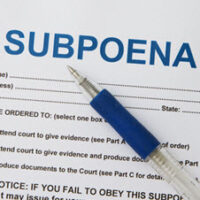What To Do If You’re Not In A Lawsuit, But You Get A Subpoena

Your business isn’t in trouble. You’re not in any lawsuits and you’re not suing anyone. Nobody’s even upset with you (that you know of). And yet, suddenly you receive a subpoena for a deposition. What’s this all about? Why do you have this? And most importantly, what do you do now?
Getting Information From Non-Parties
Parties in a lawsuit can certainly get documents from, and depose, each other. But they’re also allowed to depose and get documents from third parties—people or entities that aren’t parties to the lawsuit. That’s because often parties that aren’t involved in a lawsuit have information that is vital to the lawsuit.
Initial Steps
If you are served with a notice of deposition or subpoena duces tecum, which is a request for documents, the first step is obvious—read what the document is requesting. Sometimes it will just ask you for documents. Get the documents, provide them, and your job is done. Other times it will want both documents, but also will want you to sit for deposition.
When you see what documents the subpoena is requesting, it’s time to make a decision that your business lawyer can help you make. The decision is whether to provide what is requested, or whether to ask the court for a protective order.
Note that a subpoena has a time limit to object, so if there is something there that you don’t think you should have to produce, you need to timely act on it. You can object by sending a notice to the requesting party that you object, but for permanent protection, you should consider filing a protective order.
Grounds for Protective Orders
There are a number of grounds that you can use to object to producing documents. Some include:
- The subpoena requests information that constitutes your trade secrets, financial information about you or your business, or confidential information.
- The subpoena asks for information that could violate the privacy or personal information of your customers or clients
- Producing the information requested would be extraordinarily costly, or time consuming. For example, the request would require you to go to a warehouse and spend hours combing through documents, and then require you spend serious money on copying and delivering the documents.
- The documents are privileged somehow—such as, they would intrude on lawyer client privilege, or your personal financial information.
What if You Don’t Have the Requested Information?
You can say that you do not have documents that are requested, if you really don’t have them, or they don’t exist. You can expect to be questioned further about why you don’t have the requested documents if you respond that way.
You also have the right to ask to have the deposition rescheduled, if it is truly inconvenient for you. If the other side does not agree, you may need to file a protective order to avoid having to attend on the scheduled date—just not showing up can land you in legal trouble.
You should have a business law attorney ready to answer questions, should you receive any legal documents. Call the West Palm Beach commercial litigation lawyers at Pike & Lustig for help today.
Resource:
casetext.com/rule/florida-court-rules/florida-rules-of-civil-procedure/forms/form-1922-subpoena-duces-tecum-without-deposition
